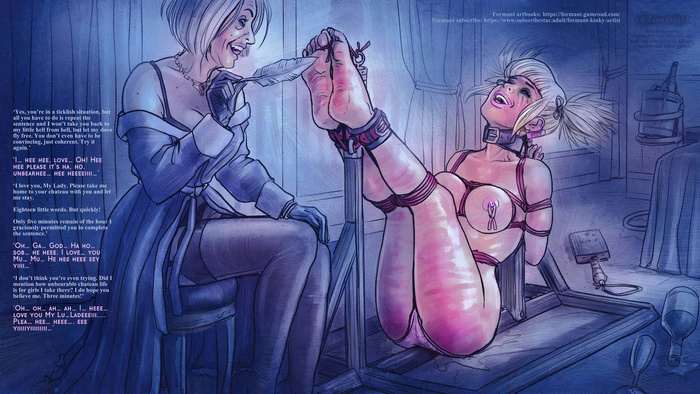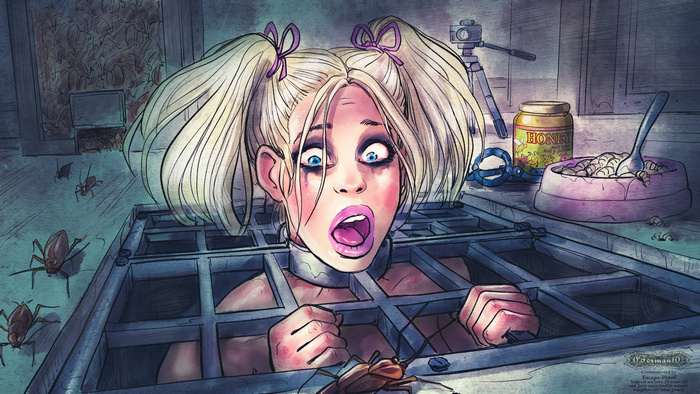Humilation and Abuse
articles and tutorials BDSM terms glossary Domination and submission tutorial
Erotic pleasure from being humiliated or embarrassed. It is important, though, that the person being humiliated knows it is based in fantasy and not in a genuine attempt to hurt self-esteem. Humiliation can take many forms; to some, being spanked is humiliating, especially on the bare.

Humilation
Making someone feel ashamed or foolish by injuring their dignity and self-respect, especially publically. It sounds like a terrible thing to do but there are those who enjoy it in certain kinds of role-play or relationships. Mental domination exercised through humiliation or praise can be positive if it offers the person receiving it feelings of security, self-worth, or enhances sexuality (for example in the case of a slave being willingly trained to please her master). It can also be destructive, where an unscrupulous dominant finds the weaknesses and insecurities of a submissive and then uses them to 'break' her for his own purposes and without regard for her well-being. Often it can be hard to fully understand the dynamics of a relationship from the outside. The best rule of thumb is that if it leaves you feeling good about yourself, its probably OK, but if it leaves you feeling bad then something is wrong. Genuine attacks on a persons self-respect or sexuality that are designed simply to break their spirit are not confined to D/s and are abuse wherever they occur. It is no more acceptable for a woman to be abusive than it is for a man.

Abuse
Both men and women can be abusers. If you see a big, beefy guy beating a tiny woman black and blue with a bullwhip, is that abuse ? If you see an agressive woman at a party humiliating a seemingly hen-pecked male partner about the inadequate size of his dick, is that abuse ? The answer in both cases is that things aren't always what they seem. To many people all BDSM is abusive, but those involved know it's a bit more complicated than that. One fundamental difference between BDSM and abuse is that the former is consensual but the latter isn't.To an outsider this distinction may not be obvious, however abuse is only present where consent is absent. Many D/s relationships are characterised by deep levels of caring and kindness but only a fool would deny the dangers inherent in a lifestyle where relationships can be based upon domination and submission (D/s). Sometimes BDSM draws to it people who have been psychologically damaged by rape or previous abusive relationships. It also attracts bullies who need to abuse others to compensate for their own insecurities. There are obvious risks, so exercise great care in your choice of partners and relationships if you wish to explore BDSM. The basis of any successful D/s relationship is a mutual fulfillment of needs. If it does that, then it doesn't matter how odd it may seem to anyone else. No-one can judge a relationship from the outside because only the persons involved know whats really happening, but that never stops meddlers. Every day couples part because of the ill-informed and often prejudiced advice of 'friends' and self-styled 'experts'.
Believe me, there is no 'rule-book' for D/s relationships because each one is unique.The best, and possibly only, indicator is how you feel about yourself within the relationship. If you feel happy and valued then it's probably right for you. If you are left feeling degraded, hurt or depressed on a regular basis then something's wrong. If you feel that you are in an abusive relationship you must either take action to change it or get out. Certainly 'doing nothing' isn't a sensible option because abuse has a habit of getting worse and any violence is likely to become more severe in a recurring cycle of damage and remorse. In any relationship that is going wrong the first step is always to try talking to your partner, openly and honestly, about how you feel. Everyone makes mistakes. Sometimes people genuinely don't understand the effect of their words and actions on others. Try talking first if you can. If that doesn't work then you can either seek help (some form of counselling for both of you) or just walk away. If your partner doesn't acknowledge the problem and resists any external help then terminating the relationship may ultimately be your only realistic option. Whatever other considerations there are your safety, both emotional and physical, must come first. Local psychotherapists, doctors, or religious counselors can all help.
There are many other resources, both locally and nationally, to help those in abusive relationships. Understand though that most 'vanilla' (non-BDSM ) people do not understand, are scared by, and are censorious of, any D/s relationship and may automatically see it as abusive. Others who have been in abusive relationships may be understanding but they can also lack objectivity because of their personal history. 'Friends' advice is often filtered through their own prejudices. Only you can judge whether the relationship is abusive. You're the only one whose opinion matters on this subject.




